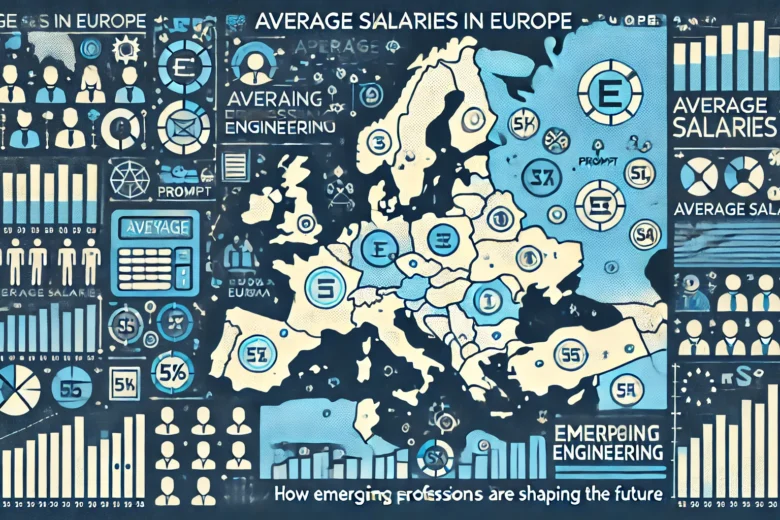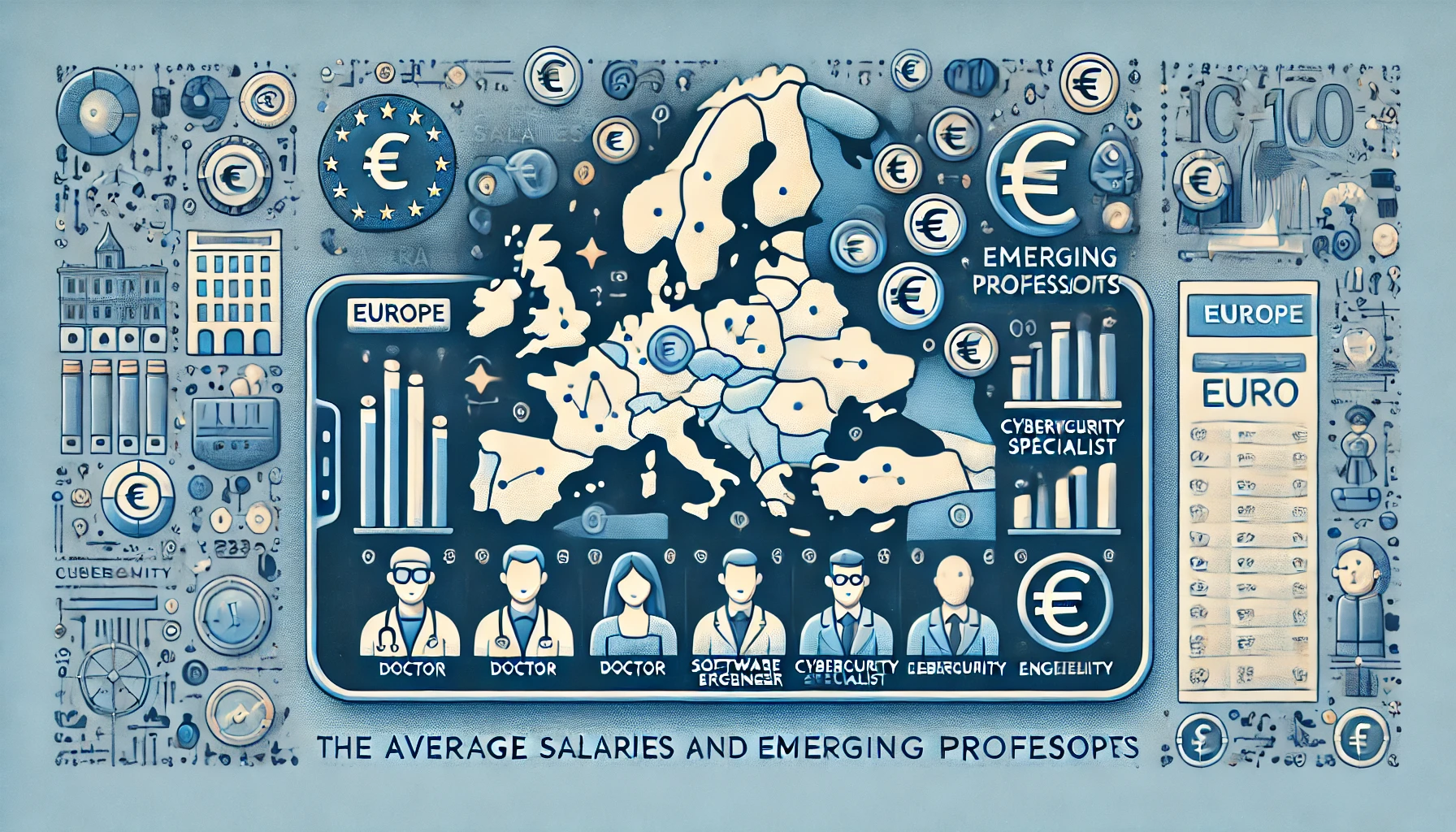The European job market presents a broad spectrum of career opportunities and salary expectations. This expanded article will explore the average salaries across traditional and emerging professions, comparing them across different European countries. It will also provide insights into some of the newest roles that have arisen due to technological advancements, such as Prompt Engineer, Growth Hacker, Cybersecurity Specialist, and more.
1. Understanding Average Salaries Across Europe
Before delving into specific professions, it’s important to acknowledge that salary levels vary greatly depending on the country. Factors such as the cost of living, economic stability, and industry growth influence compensation. We’ll break down the average salaries for a range of key professions, showing how they compare across five major European countries: Germany, France, United Kingdom, Spain, and Portugal.
1.1. Traditional Professions: Salary Comparison by Country
1. Digital Marketing Specialist
• Germany: €45,000 – €65,000 annually
• France: €40,000 – €60,000 annually
• United Kingdom: £35,000 – £55,000 (approximately €40,000 – €65,000)
• Spain: €30,000 – €45,000 annually
• Portugal: €25,000 – €35,000 annually
As companies continue to shift towards online strategies, digital marketing professionals are in high demand. Germany and the UK lead with the highest compensation, reflecting the importance placed on digital transformation in these markets.
2. Project Manager
• Germany: €55,000 – €75,000 annually
• France: €50,000 – €70,000 annually
• United Kingdom: £45,000 – £70,000 (approximately €52,000 – €82,000)
• Spain: €35,000 – €55,000 annually
• Portugal: €30,000 – €45,000 annually
Project management remains a lucrative career, especially in sectors such as IT, construction, and finance. Higher salaries in Germany and the UK are attributed to complex, large-scale projects requiring experienced professionals.
3. Human Resources Manager
• Germany: €60,000 – €85,000 annually
• France: €50,000 – €75,000 annually
• United Kingdom: £50,000 – £80,000 (approximately €58,000 – €92,000)
• Spain: €35,000 – €55,000 annually
• Portugal: €30,000 – €50,000 annually
HR managers play a crucial role in shaping company culture and managing talent, with higher wages often seen in countries where labor laws are complex, such as Germany and the UK.
4. Graphic Designer
• Germany: €35,000 – €50,000 annually
• France: €30,000 – €45,000 annually
• United Kingdom: £28,000 – £45,000 (approximately €32,000 – €52,000)
• Spain: €25,000 – €35,000 annually
• Portugal: €20,000 – €30,000 annually
Although not the highest-paid profession, graphic design remains essential across industries, particularly for marketing and branding. Freelancers may earn more through international projects.
2. Emerging Professions and Their Salary Expectations
The rapid evolution of technology and business practices has led to the creation of new roles. These professions often command higher salaries due to the specialized skills required.
2.1. Growth Hacker
Growth Hackers are experts in rapidly scaling a business by leveraging unconventional marketing techniques and data-driven decisions. This role is especially popular in tech startups and online companies.
• Average Salary: €50,000 – €90,000 annually
• Skills Required: Digital marketing, data analysis, creative problem-solving, and understanding of product development.
• Demand: High in tech hubs such as Berlin, London, and Paris.
2.2. Cybersecurity Specialist
With increasing concerns about data breaches and cyber threats, Cybersecurity Specialists are in high demand. They protect company data, networks, and systems from potential attacks.
• Average Salary: €70,000 – €120,000 annually
• Skills Required: Knowledge of network security, encryption, ethical hacking, and regulatory compliance.
• Demand: High across all industries, particularly in finance, healthcare, and technology sectors.
2.3. UX/UI Designer
The need for user-friendly digital experiences has made UX/UI Designers essential in the development of websites, apps, and software.
• Average Salary: €45,000 – €80,000 annually
• Skills Required: Design tools (Figma, Adobe XD), user research, prototyping, and understanding of front-end development.
• Demand: High in e-commerce, fintech, and tech companies.
2.4. Data Scientist
Data Scientists use statistical analysis and machine learning to extract insights from data, aiding companies in making informed decisions.
• Average Salary: €80,000 – €130,000 annually
• Skills Required: Programming (Python, R), data visualization, statistical modeling, and big data tools (Hadoop, Spark).
• Demand: Very high, especially in sectors like finance, tech, and healthcare.
3. The Impact of New Professions on Traditional Roles
3.1. Blurring the Lines Between Jobs
The emergence of roles like Growth Hacker, Prompt Engineer, and Data Privacy Officer is transforming the traditional boundaries between different job functions. Marketing specialists now require knowledge of data science, while developers are increasingly involved in security.
3.2. Increased Emphasis on Lifelong Learning
With the rise of these new professions, there’s a growing need for continuous learning. Many universities and online platforms have expanded their course offerings to include AI, data analytics, and cybersecurity, catering to professionals looking to upskill or reskill.
3.3. Impacts on Salary Structures
The introduction of specialized roles often results in higher starting salaries, as companies compete for a limited pool of talent. However, as more individuals acquire these skills, salaries may stabilize.
4. Challenges and Opportunities in the Evolving European Job Market
4.1. Adapting to Technological Changes
Professionals must stay updated with the latest technological advancements to remain competitive. This includes adopting new tools, frameworks, and methodologies relevant to emerging roles.
4.2. Regional Disparities in Salaries
While roles like Prompt Engineer may command high salaries across Europe, the compensation can still vary significantly by region. Northern European countries such as Germany and the UK generally offer higher wages than Southern Europe (Spain, Portugal), where the cost of living is lower.
4.3. Remote Work as a Salary Equalizer
The shift towards remote work has enabled companies to hire talent from across Europe, potentially narrowing the salary gap between countries. For example, a Cybersecurity Specialist in Portugal may be able to command a salary closer to their counterparts in Germany if they work for an international company.
5. Professions in the Creative Industry: Salaries and Trends
The creative industry encompasses a range of roles, from Graphic Designers to Content Creators, with salaries varying based on experience, skills, and project scale.
5.1. Content Creator/Influencer
With the rise of social media, many have turned to content creation as a career. While earnings can be highly variable, established influencers can earn significant amounts through sponsorships and ad revenue.
• Average Income: €30,000 – €100,000+ annually (depending on platform popularity and follower base)
• Skills Required: Content strategy, video editing, social media management, and branding.
5.2. Video Game Designer
The gaming industry in Europe is booming, with demand for Video Game Designers who can create compelling stories and immersive experiences.
• Average Salary: €50,000 – €90,000 annually
• Skills Required: Game engines (Unreal, Unity), 3D modeling, programming, and narrative development.
• Demand: High in countries with thriving gaming industries, such as the UK, France, and Poland.
Conclusion
The European job market is undergoing significant transformations, with both traditional and emerging professions evolving to meet the demands of a technology-driven world. While classic roles like software engineering, healthcare, and project management continue to provide solid career prospects, new professions such as Prompt Engineer, Cybersecurity Specialist, and Growth Hacker are reshaping salary expectations and required skills.
For professionals and job seekers, staying informed about salary trends and embracing lifelong learning will be crucial to navigating this rapidly changing landscape. Those who adapt to the demands of emerging technologies and roles will find themselves well-positioned to take advantage of the evolving opportunities in the European job market.
Image Suggestions:
1. A heatmap showcasing the average salaries for various professions across Europe.
2. A graphic illustrating the skills required for emerging roles like Prompt Engineer, Data Scientist, and Cybersecurity Specialist.




